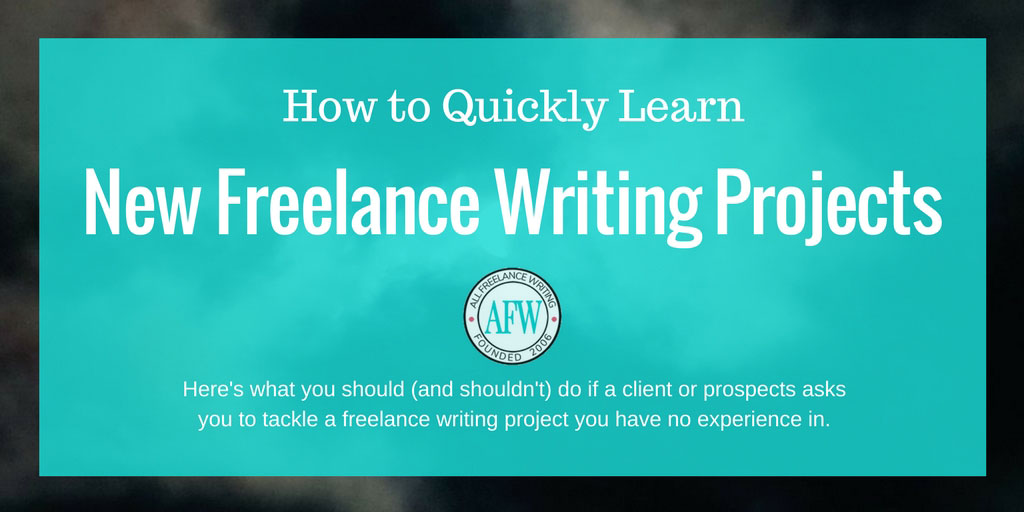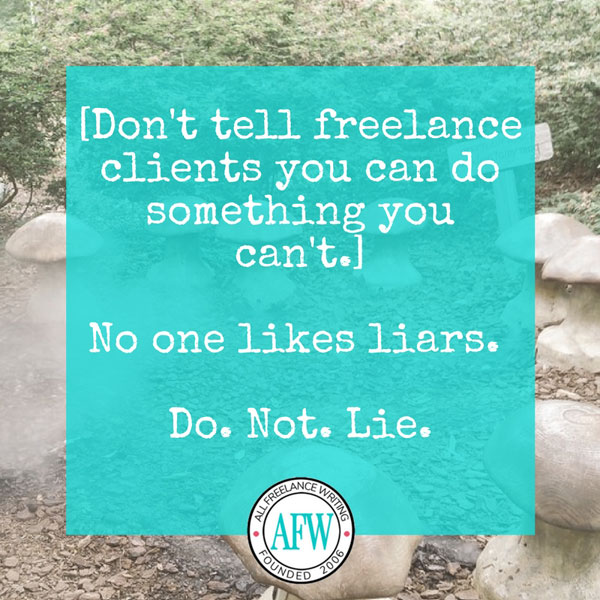
This post contains an affiliate link to Peter Bowerman's Well-Fed Craft course.
For new freelance writers, one of the most common challenges I hear about is the fear that sets in when a client asks them to take on a freelance writing project they've never done before. For example, perhaps they usually write web copy, and a client asks them to write a case study. Or a freelance blogger might suddenly be asked to write email marketing copy.
One option, of course, is to say "no thanks." But these days clients often expect their freelance writers to be able to take on more than one project type, especially if they have a long-term working relationship.
And that's one of the benefits of those long-term relationships, right? You'll already be trusted, and you'll be the first writer the client thinks of when they need something new.
A while back, a reader named Mohammed emailed me asking about this. English wasn't his first language in this case, so I'm going to paraphrase his question to simplify. Basically, what Mohammed wanted to know was:
What's the quickest way for a freelance writer to learn new project types when a client asks for something you've never written before?
The Importance of Honesty
I'm not just a freelance writer. I've also hired quite a few (probably at least a couple dozen for my own projects over the years, as well as hiring on behalf of clients big and small). And while I've seen some freelancers tell new folks to outright lie, tell clients they can do something they've never done, and figure it out after they sign a contract, let me tell you... if I'd been the one hiring you and you did that, I'd have canned your ass the second that became clear.
That is the number one thing to keep in mind when a client asks you to do something you've never done before.
No one likes liars.
And you probably aren't the exception who's both unethical enough and a quick enough learner to not get caught. Do. Not. Lie.
What do you do instead? You admit you don't have experience in that particular project. You tell the client you're willing to give it a try if they're open to it.
If there are similarities between that project and other work you've done (like being asked to write a sales page when you usually write high-converting email marketing copy), point out that while you haven't done that exact project, you've done this similar type of work. Then it's not as risky for them to take a chance.
If you have absolutely no related experience that would translate to the new project type, you can always offer a one-time discount (make sure you can use it in your portfolio or get a direct testimonial about it if you do this), or you can offer more edit request rounds than usual as you'll have a bit of a learning curve.

Quickly Learn New Freelance Projects
Now, if you've been honest with your client and they still want to move forward (in my experience, they almost always have), you'll want to do a quick study on the new project type.
You could turn to a course like Peter Bowerman's Well-Fed Craft, where he guides you through example projects like case studies, showing you real-world successful examples. (That's an affiliate link by the way. I'm proud to support Peter's course, and you can read my full review for more information about why. On the review page, you can even listen to a podcast excerpt where Peter and I chat about case studies.)
If you don't have time to really dig in and you need a quick primer, your next best option is simply Google. Search for:
- Tutorials on how to write the new project type you want to learn;
- Tips and advice from pros who do it (like this older client post of mine as an intro to how to write a white paper);
- Real world examples (there are plenty of online case studies, white papers, press releases, blog posts, feature articles, promotional videos you could analyze for scripts... just about any project type you could think of).
It really is that easy.
Will looking at guides and existing examples make you an expert at that project type? Absolutely not. Only one thing will do that:
Practice.
If your client knows you're inexperienced and is still willing to approve the project, work with whatever time you have. If that just means reading as many samples as you can, do that. If you'll have enough time to write practice pieces, create mock samples just to try your hand at them (or create the same project types to promote your own business -- then you get marketing benefits out of your practice time too).
What about charging the client for your learning time?
Should you?
I know a couple of freelancers who do this any time they have to learn something brand new. They factor that into their project costs. You could do this. Personally, though, I'm not a fan in most cases.
The way I see it is that, as freelance writers, we're going to keep learning as we go. That's a part of the job. It's not something we're generally doing for one client. It's something we're doing for ourselves, by building more marketable skills. And that effort will more than pay for itself in time. If a client's willing to give you a chance even knowing you're inexperienced at something, charging them extra feels entirely unethical to me.
The only exception (for me) would be if a client requested a project so rare that it would have little-to-no marketing value for me with other future clients.
For example, a musician I worked with was also a professional artist with a bit of a cult following (he'd done art for some major bands in addition to being fairly well-known in the indie music world himself). He tied some of those creative things together and created a set of branded trading-card-style promotional pieces. Like much of what he did at the time, he asked me to handle the copy on those cards.
Goodness knows I'd never done something quite like that before. And I sure had no intention of promoting that as a service to future clients.
With something like that, there's an understanding the project will take longer than most other copy, because you're navigating new territory (a key struggle there was getting the info they wanted worked in with the physical space constraints -- like brochure design, only tougher).
You can either charge your normal rate and eat the cost of that added time (not ideal), or you can charge more for the project as a whole to account for the extra time you expect. If a client wants you to do something totally outside the norm (or they insist you learn specific tools that otherwise wouldn't be necessary), I'd recommend the latter.
If you're looking to learn new freelance writing project types, I'll have some upcoming resources for you before the end of this month.
I spent much of the last year and a half privately helping another writer do that, among other things, to resurrect and grow their business. Because that time spent on so much private help (such as creating templates, cheat sheets, and even an outright e-book) feels rather wasted right now, I've decided to de-personalize much of it and release those things here (most, if not all, for free) through the All Freelance Writing resources collection.
Keep an eye out for those. If you're subscribed to the email list, you'll be notified when those get added.
Additionally, this week's Weekend Reading round-up will be a follow-up on this reader question, pointing you to a variety of templates and guides to help you tackle new project types. So check back on Friday for that.
Do you have a freelance writing question you'd like me to answer on the blog? Send me your questions and I'll do my best to help.
